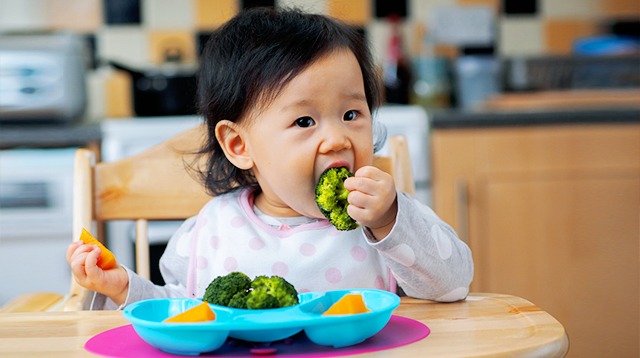
Can Toddlers Learn to Read?
March 28, 2024
Identifying the Creative Genius in Your Baby
May 31, 2024
Understanding the Importance of Healthy Eating for Toddlers:
1. Fueling Growth and Development: Toddlers experience rapid growth and development, both physically and mentally. Proper nutrition during this stage is crucial for supporting brain development, building strong bones and muscles, and establishing a healthy foundation for the years ahead.
2. Developing Taste Preferences: The toddler years are a critical time for shaping taste preferences. Introducing a variety of nutritious foods early on can help develop a diverse palate, making it more likely that children will embrace a range of healthy foods as they grow older.
3. Building a Healthy Relationship with Food: Cultivating a positive attitude towards food is essential. Encouraging mindful eating, fostering a connection to the sensory aspects of meals, and avoiding food battles create a foundation for a healthy relationship with food.
4. Preventing Nutrient Deficiencies: Toddlers have specific nutritional needs, and ensuring they receive a balanced diet helps prevent nutrient deficiencies. Key nutrients during this stage include iron, calcium, vitamin D, and healthy fats, all of which contribute to overall health and well-being.

Effective Meal Planning for Toddlers:
5. Establish a Routine: Toddlers thrive on routine, and this extends to their eating habits. Establish regular meal and snack times to create a predictable eating schedule. Consistency fosters a sense of security, and toddlers are more likely to eat well when they know when to expect their meals.
6. Create Balanced Meals: Aim to include a variety of food groups in each meal to ensure your toddler receives a broad range of nutrients. A balanced meal typically includes a source of protein, whole grains, fruits, vegetables, and a healthy fat. Experiment with different combinations to keep meals interesting.
7. Encourage Self-Feeding: As toddlers develop fine motor skills, encourage self-feeding. Offer finger foods and utensils appropriate for their developmental stage. Allowing toddlers to explore and feed themselves promotes independence and a positive association with mealtime.
8. Make Meals Colorful and Appealing: Toddlers are drawn to vibrant colors and interesting shapes. Present meals in a visually appealing way by incorporating a variety of colorful fruits and vegetables. Creating visually enticing meals can make the dining experience more enjoyable for your toddler.
9. Offer Water with Meals: Introduce the habit of drinking water with meals. Water is essential for hydration and aids in digestion. Limiting sugary drinks and providing water as the primary beverage helps instill a preference for a healthy and hydrating choice.
Wholesome Snack Ideas for Toddlers:
10. Fresh Fruit and Veggie Sticks: Slice fruits like apples, berries, or melons into bite-sized pieces. Offer vegetable sticks such as carrot, cucumber, or bell pepper with a mild dip like hummus. The combination of colors and flavors makes these snacks appealing to toddlers.

11. Greek Yogurt Parfait: Layer Greek yogurt with granola and fresh berries to create a tasty and nutritious parfait. Greek yogurt is rich in protein and calcium, supporting your toddler’s growing bones and muscles.
12. Cheese and Whole Grain Crackers: Provide small cubes of cheese with whole grain crackers for a satisfying and balanced snack. Cheese offers calcium, while whole grain crackers provide fiber and energy.
13. Homemade Trail Mix: Create a toddler-friendly trail mix by combining whole-grain cereal, dried fruit, and unsalted nuts. This snack provides a mix of carbohydrates, healthy fats, and vitamins.
14. Nut Butter and Banana Slices: Spread a thin layer of nut butter on whole grain bread or rice cakes and top with banana slices. This snack offers a blend of protein, healthy fats, and natural sweetness.
15. Vegetable Muffins: Bake savory muffins with finely grated vegetables like zucchini or carrots. Use whole wheat flour for added fiber, creating a nutritious and tasty snack.
16. Mini Whole Grain Quesadillas: Fill small whole grain tortillas with cheese and finely chopped vegetables. Heat until the cheese melts for a delicious and wholesome snack.
17. Smoothie Popsicles: Blend a variety of fruits with yogurt or milk, and pour the mixture into popsicle molds. Freeze for a refreshing and nutrient-packed treat.
18. Egg Muffins: Whisk eggs and pour them into muffin tins with diced vegetables and cheese. Bake until set for a protein-rich and portable snack.
19. Oatmeal Banana Cookies: Mash ripe bananas and mix them with oats to create simple and nutritious cookies. Bake until golden brown for a wholesome, naturally sweet snack.
20. Hummus and Whole Grain Bread: Offer hummus as a dip with whole grain pita bread or breadsticks. Hummus is a versatile and protein-rich option that pairs well with various dippable foods.
Encouraging Healthy Eating Habits:
21. Lead by Example: Children often imitate the eating habits of adults around them. Demonstrate healthy eating habits by enjoying a variety of nutritious foods yourself. Make family meals a positive and communal experience.
22. Involve Your Toddler in Meal Preparation: Engage your toddler in age-appropriate meal preparation activities. Whether it’s washing vegetables, stirring ingredients, or arranging food on a plate, involving them in the process fosters a sense of ownership and excitement about the meal.

23. Be Patient and Supportive: Toddlers can be selective eaters, and it’s common for them to show preferences for certain foods. Be patient, avoid pressuring them to eat, and offer a variety of options. Supporting a positive attitude towards food takes time and encouragement.
24. Create a Pleasant Mealtime Environment: Make mealtime enjoyable by creating a pleasant atmosphere. Avoid distractions like screens during meals, use colorful and child-friendly dishes, and engage in positive conversation. Creating a positive association with mealtime contributes to healthy eating habits.
In the journey of fostering healthy toddler eating habits, patience, creativity, and a bit of culinary exploration play key roles. By prioritizing balanced meals, introducing a variety of nutritious snacks, and creating a positive mealtime environment, you set the stage for your toddler to develop a lifelong love for wholesome foods. Remember, each child is unique, and finding the right balance that works for your toddler may involve some trial and error. Celebrate small victories, savor the joy of exploring new flavors together, and relish in the nourishment of both body and spirit that comes with cultivating healthy eating habits from an early age.




